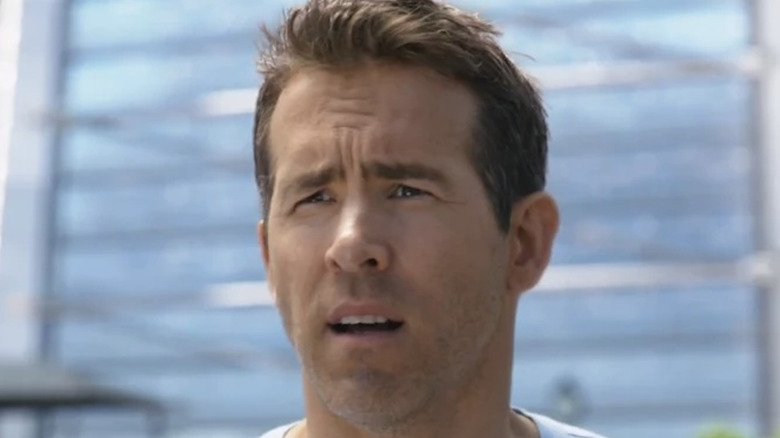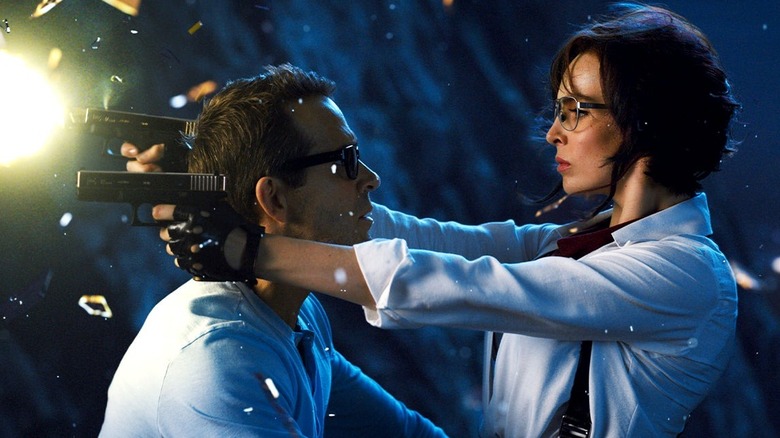Free Guy Review: The N00b Tube
A movie that goes a long way simply by being so darn likable, "Free Guy" has no right to be as fun as it frequently feels. The script is all over the place, the logic doesn't hold up to the slightest scrutiny, half the story beats are stolen from better movies, and it ends with — cliches be damned — a person running down the street, desperate to profess undying love to their soulmate. But Ryan Reynolds is adorable, there are cameos and cross-franchise intellectual property moments that will make audiences cheer, and there are worse ways to spend two hours than diving into this virtual world and forgetting the problems of the real one.
The film follows Guy (Reynolds), an endlessly-optimistic Non-Player Character (NPC) in a "Grand Theft Auto"-like video game. Blissfully unaware of any world beyond his own, Guy spends every day doing the same thing: Wake up in nondescript apartment, grab a coffee (with two sugars), go to work at the bank, get robbed a few times, come home and go to bed. There are people walking down the streets of his city every day shooting flamethrowers, his buddy Joe is constantly getting tossed through a plate glass window, violence is everywhere — but Guy doesn't mind, it's just another day in Free City.
Until one day, when Guy gets his hand on some sunglasses ("They Live," anyone?) which open up his eyes to the reality of his surroundings. He then comes across Molotov Girl, a sexy Lara Croft type who is actually the "Free City" avatar of Millie (Jodie Comer), a game designer who believes her code was stolen and turned into this game's framework. Her former partner Keys (Joe Keery) works for Soonami, the company owned by flaky game publisher Antwan (Taika Waititi), and when Guy falls hard for Molotov Girl and begins counter-programming his life to become the hero of "Free City," Keys takes notice.
In no time, the movie has Guy rebelling against everything in his game, Millie and Keys teaming up to assist him in the hopes he can find evidence inside the game that "Free City" was built from their stolen code, and Antwan trying to shut the game down to hide his crimes, stop Guy, and allow him to release a cash-grabbing sequel.
Just another day in Free City
The first third of "Free Guy" is essentially "The Lego Movie," with dim-but-affable Emmet ... um, Guy, being awoken from his life of monotony and coffee by adventurous, badass Wyldstyle ... um, Molotov Girl. After she opens his eyes to the larger battle that demands he become a hero, the second third of the film becomes "The Truman Show." At this point, Truman ... um, Guy, becomes a worldwide celebrity with millions of people all over the world tuning in to watch his every move. Freshly aware of his power, he begins to leverage his newfound notoriety to strike back against the godlike overseer who put him into this experiment, attempting to take down the sham "world" that has surrounded his entire life.
The final third of "Free Guy"? Well, that's really the only time the movie truly comes alive, intoxicated by its own possibilities and boasting random, sometimes inspired moments. Many of those are built around Dude and ... well, more about him later.
Ryan Reynolds once again proves himself to be a truly priceless commodity in Hollywood. With the looks of a leading man, the physicality of an action star, the timing of an A-list comedian, the smarts to pick good projects (most of the time), and the self-deprecating charm of someone audiences can simultaneously identify with and be jealous of, he's the Hollywood equivalent of what baseball scouts would deem a five-tool player. There is, quite literally, no one else in Hollywood like him right now. Here, he plays a bit dumber than usual, but by the end of the film he's fully aware, firing on all cylinders, and fully Ryan Reynolds at his best.
Comer and Keery are serviceable, playing real-life counterparts helping out Guy's evolution. The notion that the two of them are supposed to have this undeniable chemistry, held back by years of silently working side by side without expressing it, is a stretch the audience is asked to believe. So by the time the third act rolls around, any scene dependent on the audience yearning for them to be together is an unwanted eye-roller, serving only to get in the way of our fun.
Every few years, somebody comes along in Hollywood who isn't so much an actor as a force of nature. Do you remember when Pauly Shore was huge? How about Russell Brand? Or Ken Jeong? Hollywood puts them in every movie they can be squeezed into for a few years, seemingly with the thought of "Get that guy, don't even write him lines, just let him do his thing everybody loves." After a half-dozen movies or so, the shark has been jumped.
As painful as it is to say, "Free Guy" might be that moment for Taika Waititi. Currently the toast of Hollywood, the guy is everywhere — and as a writer/director, he has a "Thor" movie, a "Star Wars" movie, and a "Flash Gordon" movie supposedly on the horizon, which will all likely turn out great with him behind the camera. As an actor, however, it's clear that he was given far too much rope in creating Antwan, and he often feels like the kid speaking in front of the classroom who never bothered to read the book and thought he could just coast through the report on charm alone. There are entire scenes where he's obviously "improv-ing" and "riffing" and it's all "painfully unfunny." It doesn't feel like a performance so much as it seems like they just gave Waititi a mouthful of M&Ms and an espresso from the craft service table, then pointed a camera at him.
This might be the fault of director Shawn Levy, who has built a fascinating career as the filmmaker your average person on the street could never name, even though they've likely seen his work. "Just Married," "Cheaper by the Dozen," the "Night at the Museum" films — all pleasant diversions at the time, none of them particularly worth revisiting for any reason. "Free Guy" is another film that doesn't feel like it will age particularly well, and it seems like Levy was content to let Taika Waititi run wild and then try to edit all those different takes together into a performance. By the end of the film, Antwan is running around with an axe, trying to destroy a server room; like so much else in "Free Guy," it doesn't make a lot of sense.
Pecking it in
But hey, let's talk about Dude — far and away the best part of "Free Guy," and an action figure that needs to be made immediately. At the film's climax, Antwan uploads the musclebound, shirtless "new" Guy (played hilariously by Reynolds with his face superimposed on a super-buff body), but doesn't wait until his programmers have finished with the character's development. As a result, Dude has a tendency to say phrases like "TBD" out of nowhere, punctuated by his unforgettable catchphrase: "CATCHPHRASE!"
During the epic smackdown between Guy and Dude, the "real world" good guys assist by giving the hero weapons that the "Free Guy" audience will recognize immediately. Guy turns the tide by whipping out Captain America's shield, Hulk's fist, a lightsaber, and a "Fortnite" weapon, although it isn't entirely clear why he would know what any of these things are — after all, the only existence he's ever known is inside his video game.
Which helps sum up all of "Free Guy": the less you think about it, the more you'll enjoy it. Why does "Free City" look like Boston, but never acknowledges its unmistakable backdrop? If Guy is alive and self-aware (thanks to artificial intelligence), aren't all the other NPCs also alive, and doesn't that mean Antwan killed hundreds of living souls when he destroyed dozens of servers? How does the game keep getting turned off, then turned back on, all while the world (and Chris Evans) seem to be watching live? If Dude is designed to only love Millie, isn't he doomed to live the rest of his life alone and miserable? Why does Guy's bank pal Buddy (Lil Rel Howery) sometimes seem to possess artificial intelligence and self-awareness, but other times doesn't have it? How many times can this movie make the same lazy "gamers are all losers who live at home with their moms" joke, and how many more times do we have to listen to that Mariah Carey song?
"Free Guy" is a mess, the cinematic equivalent of trying to carry on a conversation with someone who can't hold a thought for more than a minute at a time and keeps telling other people's stories. Sure, some of their comments will be funny from time to time, but there's nothing of substance, and little worth remembering after they've walked away. It's a pleasant enough diversion — but if you're looking for something substantial and smart, this just isn't your Guy.


